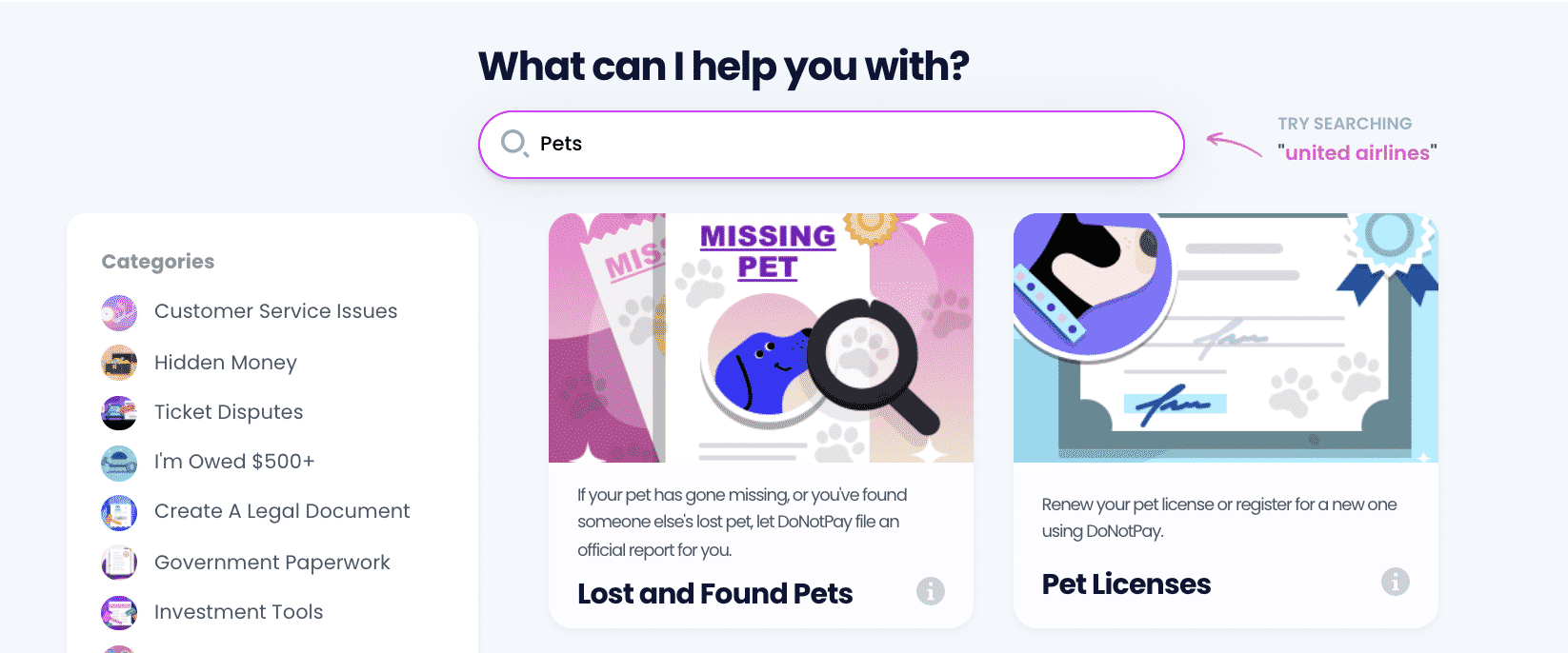How Far Do Cats Roam When Lost?
Cats have been roaming the earth for a long time. But while we know from our own observations that cats are happy to explore their environment and venture into new territory, just how far do cats roam when lost? The answer may surprise you.
Studies have shown that cats will travel an average of around three miles when lost. Cats are creatures of habit and will usually stick to a routine. So if your cat suddenly goes missing, there's a good chance something may have disrupted their normal routine. This could be anything from a change in their environment - such as a new pet or baby in the home - to a health problem that is making them feel unwell.
If your and you're not sure what to do, DoNotPay can help.
What To Do if Your Cat Goes Missing
If your cat goes missing, it's important to act fast. Cats are creatures of habit and will usually stick to a routine when they're in familiar territory. They'll return when they feel like it or when they get hungry or run out of supplies. In the meantime:
- You should keep their bowls filled with fresh water and food at all times.
- If they have been used to being let out at specific times of the day, you should stick as close to those times as possible - this will help show your cat that their environment is familiar and still safe for them.
- As a rule of thumb, if your cat has not returned within 36 hours, it's time to start searching for your furry friend.
- Cats are good at hiding so you might not see them straight away. Make sure to check in bushes, garages, and under cars. If you live near a park or woodland area, it might be worth checking there too.
| What is the Difference Between Cats and Dogs? | Dogs are pack animals and usually travel in groups. Cats, on the other hand, are solitary creatures and prefer to wander alone. This is why cats are more likely to go missing than dogs.
Dogs will also bark or howl when they're lost, which can help their owners find them. Cats, on the other hand, are very quiet creatures and will usually meow to communicate with their owners, rather than make a fuss. |
| Will an Indoor Cat Come Back Home? | It's important to keep in mind that just because your cat is an indoor cat, it doesn't mean they won't go missing. Cats are curious creatures and can easily find a way out of the house - whether it's squeezing through a crack in the door or jumping out of an open window.
While it's important to be prepared in case your cat goes missing, it's also worth noting that cats usually come home. Most cats will return to their owners once they've familiarized themselves with their surroundings and feel safe again. |
If You Find a Stray Cat
If you find yourself coming across a stray cat in the local area, your first instinct may be to take it in and care for it yourself. While it may be tempting to take in a stray cat you've found, don't forget that it's illegal to do so without the owner's permission.
While there's nothing wrong with wanting to help out a furry friend in need, it's important to remember that not all stray cats are lost. In fact, some cats may just be taking a break from their home and will return when they're ready.
If you're not sure whether the cat you've found is lost or not, it's best to contact your local animal shelter. They'll be able to help you out and determine whether the cat in question is actually lost.
How To Find Your Lost Cat With the Help of DoNotPay
When a cat is lost, it's essential to contact your local animal shelter so they can help you find them. But what if you don't know where they are or what to do? That's where DoNotPay comes in.
DoNotPay is an app that makes it easy for you to contact local animal shelters, vet clinics, and rescue centers. You can search your area or post on their Facebook page to see if anyone knows where your lost cat might be.
Here's how you can use DoNotPay to report lost and found pets:
- Search "lost and found pets" on DoNotPay, and select whether you're reporting a lost pet or a pet you've found.

- Enter the date and location you lost or found the pet and tell us more about them, including the breed, gender, whether they are wearing a collar, approximate size, and more.

- Upload evidence a photo of the pet, so they can be identified, and enter your current contact information where you can be reached with updates.

And that's it! DoNotPay will file the report on your behalf, and make sure your lost or found pet gets recorded in the government directory and they know who to contact if they find a match!
Why Use DoNotPay to Locate a Roaming Cat
DoNotPay makes it easy to find lost and found pets online by taking all of the guesswork out of it:
- DoNotPay is easy to use. You can simply enter your information and upload a photo of the pet. DoNotPay will take care of the rest and contact local animal shelters on your behalf.
- DoNotPay is quick. The app takes your information and finds your lost pet for you so you don't have to spend time searching for them on social media or calling all of the local shelters yourself.
- DoNotPay is accurate. It will search local shelters and let you know which ones your pet may be at. It's the fastest way to find a lost or found pet online!
What Else Can DoNotPay Do?
DoNotPay is not just for . The app also offers a range of other services, including:
- Take Down Personal Information
- Find Lost Items
- Get Free Trials & Don't Get Charged
- File a Complaint Against Any Company
- Fight Email Spam
DoNotPay is the ultimate way to get things done quickly and easily. Sign up now!
 By
By